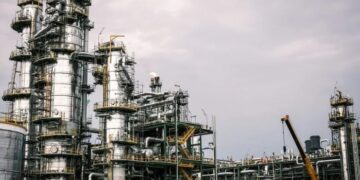By John Ikani
The Nigerian Economic Summit Group (NESG) has issued a cautionary report on the potential economic benefits of domestic crude oil refining.
While local refining offers a path towards economic growth, job creation, and reduced reliance on imports, the NESG warns that these benefits are not guaranteed.
Their report, titled “Domestic Crude Oil Refining in Nigeria, Macroeconomics and Tradeoffs,” outlines several key conditions that must be met for Nigeria to fully capitalize on local refining. These conditions include:
Regulatory reforms: Streamlining regulations and creating a business-friendly environment are crucial for attracting investment and ensuring efficient operations.
Infrastructure development: Upgrading existing infrastructure, such as pipelines and transportation networks, is essential for the smooth delivery of crude oil to refineries and refined products to consumers.
Investment in human capital: Developing a skilled workforce equipped to manage and maintain refineries is vital for long-term success.
The NESG stressed that local refining should act as a catalyst for industrialization, stimulating other sectors like manufacturing. This could enhance overall economic growth and improve the well-being of Nigerians.
However, the report also highlights a potential pitfall: the lack of domestic industries capable of utilizing all the refined products.
The NESG cites the example of the Dangote refinery, which currently exports Naphtha (a by-product) to Asia. Finished goods produced with this exported Naphtha are then re-imported into Nigeria. This scenario underscores the need for a broader industrial base to fully capture the value of local refining.
What the report said
“While the reactivation of the midstream segment is undoubtedly essential for the Nigerian economy to capitalise on the advantages of being an oil-producing nation, it alone may not suffice to deliver short-term benefits. Previous studies indicate that certain conditions must be met to ensure that the commencement of these refineries leads to significant economic growth, job creation, reduced imports, and other anticipated economic and business advantages.”
“These conditions encompass factors such as regulatory reforms, infrastructure development, investment in human capital, technological advancement, and market liberalisation. Without addressing these underlying challenges and implementing necessary reforms, the reactivation of the midstream segment may fall short of its potential to drive transformative change in Nigeria’s oil and gas industry and foster sustainable economic development.”
“Failure to position Nigeria to capitalise on these opportunities by sticking to the status quo, the country would risk allowing other emerging economies to exploit them to fuel their economic growth process. A pertinent example is the recent export of Naphtha by the Dangote Refinery to industrial complexes in Asia with Nigeria as a principal destination for goods produced using inputs sourced from the country.”
Furthermore, the report cautions against expecting a significant drop in petrol and diesel prices solely due to local refining. Structural challenges like crude oil theft continue to limit crude oil supply, keeping prices high.
Prioritizing Local Refineries vs. Government Earnings
To maximize the socio-economic benefits, the NESG recommends prioritizing the sale of crude oil to local refineries. This would reduce reliance on imports and potentially lower domestic crude oil pricing. However, the report acknowledges a trade-off: the government would likely see a decrease in revenue from crude oil sales.
Pricing Considerations
The report also clarifies that contrary to public expectation, local refining may not lead to immediate reductions in petrol prices. This is because current refiners, like Dangote, are still reliant on imported crude oil.
In conclusion, the NESG report offers a balanced perspective on local crude oil refining in Nigeria. While the potential benefits are undeniable, achieving them requires a strategic approach that addresses regulatory hurdles, infrastructure gaps, and the development of a robust domestic industrial ecosystem.




































